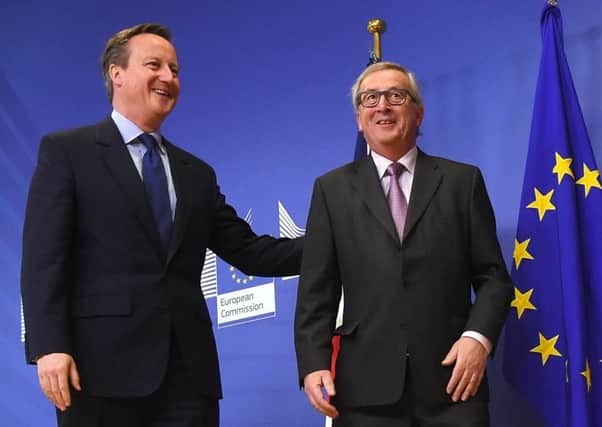Leaders: A deal over EU benefits crackdown is still way off


Although a winner has yet to emerge from David Cameron’s lengthy tussle with Brussels over his attempts to prevent EU migrants from claiming in-work benefits while in Britain, he made clear yesterday that he is ready to fight as long as necessary to have his way.
As far as the prime minister is concerned, his stance is non-negotiable. He is determined to ensure migrants cannot receive benefits until they have paid into the system. To borrow his phrase, the policy is aimed at ending the idea of “something for nothing”.
Advertisement
Hide AdAdvertisement
Hide AdEU officials have given consideration the idea of a temporary ban which could be enforced by member states, provided they can demonstrate that their welfare systems are struggling under the strain of applicants.
The president of the European Commission, Jean-Claude Juncker, has sought to make some concessions, floating the idea of a so-called “emergency brake”.
But following talks in Brussels yesterday, Mr Cameron made clear that the proposals are insufficient, describing them as “not good enough”. While progress had been made, he added, there remained a “long way to go”. Whatever chance there was of the deadlock being broken was dismissed with his comments.
Further negotiations will take place and no doubt they will be just as difficult. There are significant hurdles to be overcome before a workable temporary ban can be rolled out. Every member of the EU must agree to it and while there has been support from the likes of the Czech Republic, convincing those who are in the opposite camp, such as Poland, promises to be an uphill task.
To press ahead otherwise would go against one of the fundamantal principles of the union and see citizens from different EU states treated differently.
It is prudent to bear in mind that what is being discussed is solely concerned with in-work benefits. Mr Cameron has said he has already taken action to restrict access to out-of-work benefits for EU nationals and is confident of agreement on stopping them claiming child benefit for dependants living abroad.
Recent European case law indicates that such benefits for unemployed EU migrants can be restricted without any damaging treaty conflict.
As far as the public is concerned, what Mr Cameron is proposing for working benefits – a four year ban on migrants from within the EU claiming working family tax credits and child benefit – would probably be seen as a proportionate measure to address concerns.
Advertisement
Hide AdAdvertisement
Hide AdHowever, a major question is how effective it would be in deterring people from coming to Britain. The Department for Work and Pensions does not collect figures on the number of non-UK nationals claiming benefits at any given time.
If Mr Cameron is staking so much on this issue at a time when Britain’s discussions with the EU are entering a critical phase, he can ill afford any uncertainty over the impact of such a contentious initiative.
Anger over council funding plans
The overwhelming show of anger from the group representing many of Scotland’s councils in rejecting the Scottish Government’s funding settlement may not be the most revelatory political development of late.
While the SNP commands an unprecedented hold over representation at Westminster, Labour remains a prominent force at local authority level. With those councils that have opted out from the Convention of Scottish Local Authorities (Cosla), such as Glasgow and Aberdeen, also at loggerheads with finance secretary, John Swinney, the immediate reaction is certainly not characterised by surprise.
Yet look beyond the decision by Cosla to reject the “unacceptable” deal by 21 votes to seven and it is clear that this more than disquiet . There is growing concern that the basic tenets of democracy are being undermined.
The convention’s president, David O’Neill, described the government’s package as “an attack on our democratic mandate”, while Jenny Laing, the leader of Aberdeen City Council, said councils were being “held to ransom by the Scottish Government’s attempt to control decisions which should be made by democratically-elected representatives”.
Frustration over the centralisation of power and an erosion in local democracy is not new, but the latest deal is threatening a full-blown crisis.
Mr Swinney has said the terms of the deal are “challenging but fair.” Judging by yesterday’s responses, his assessment of the situation is optimistic.
This is not just a challenge on funding but a challenge to local democracy.